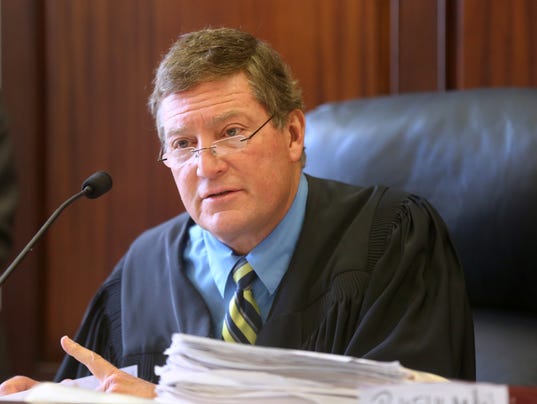
Judge Robert Ruehlman acknowledged he's acting on a hunch when he makes the call to ICE. He focuses on people who need translators or speak Spanish, have "international connections," or are accused of serious drug crimes.
The comments have troubled civil liberty and immigration advocates in Ohio. It comes amid a larger struggle nationwide over the way overlapping patchworks of jurisdictions are contending with immigration enforcement during the Trump administration. The administration has focused on harsher immigration enforcement at the Mexico border and fast-tracked deportations.
Ruehlman could not immediately be reached for comment Saturday but has given several interviews confirming and defending his actions.
"I don't see where the outrage is," Ruehlman said in a Friday interview with WLWT in Cincinnati. "Number one, they're an illegal alien. They're not supposed to be here, so they're breaking the law. Number two, they're in front of me for a felony. "
His unprompted admission came little more than a week after Cincinnati TV station WCPO broke the news that plainclothes ICE officials were entering Hamilton County courthouses to detain undocumented immigrants. ICE reportedly began its operation without alerting the county clerk or sheriff - something it is not required to do, though it's considered a professional courtesy.
In a statement to The Washington Post Saturday, ICE spokesman Khaalid Walls said that under current policy, courthouses are not considered "sensitive locations" - places like churches, schools and hospitals where immigration officials are generally discouraged from operating without prior approval.
"ICE officers have been provided broad at-large arrest authority by Congress and may lawfully arrest removable aliens in courthouses. This arrest authority is central to ICE's mission which focuses first on criminal aliens," Walls said.
Amid outcry about the practice, Hamilton County Sheriff Jim Neil denied his office was involved in any tipoff and noted in a Jan. 15 statement that he lacks the authority to bar another law enforcement agency from entering a courthouse that's open to the public.
"My primary concern is that anyone who is a victim or witness to a crime should be able to fully participate in the judicial process to further justice and remove dangerous criminals from our streets," Neil said.
ICE has the discretion to take defendants into custody and hold them, from their immigration proceedings through deportation if they're ultimately removed, before their unrelated criminal trial is finished, said Heather Prendergast, an Ohio immigration attorney and the former chair of the pro-immigrant rights American Immigration Lawyers Association National's ICE Liaison Committee.
"If the process is complete and they're found guilty, that's one thing. But when ICE doesn't allow [defendants] to particulate in the court process and have a resolution and they get deported, they have an unresolved criminal case in the U.S. still," Prendergast told The Washington Post. "It denies the victims of crimes the opportunity see justice done against the people who perpetrated those crimes. "
At least one of Ruehlman's judicial colleagues has publicly said he won't call ICE on defendants; it's unclear if judicial groups in Ohio have taken a position on Ruehlman's actions.
Jessica Vaughan, the director of policy studies for the Center for Immigration Studies, a conservative think tank that favors restricting immigration, said that while Ruehlman's admission may be rare, the attitude that underlies it is not.
For years, cooperating with ICE or otherwise facilitating its movements was the norm, Vaughan told The Post. That began to shift around 2014 in the wake of the success of Secure Communities, a controversial ICE program that enabled the FBI to share fingerprint information from state and local law enforcement arrests with federal authorities who could cross-check the data with immigration violations.
But Vaughn said noncooperation remains the exception.
"Noncooperation or being oblivious to immigration status is the aberration today: While we hear about sanctuary judges or ordinances or prohibitions on interactions with ICE, that's the exception. There are about 300 out of 3,000 counties that don't call ICE," Vaughan said. The only thing unusual about Ruehlman's action is that he's publicized it, she said.
"This is a different kind of virtue signalizing where this judge wants to raise his hand and say, 'I'm not one of these sanctuary judges,'" Vaughan said. "He seems confident this is something people in his jurisdiction approve of."
Ruehlman has continued to defend his decision, which he told the Cincinnati Enquirer results in about a dozen calls a year.
"I'm batting a thousand. I haven't got one wrong yet," he said.
Cesar Cuauhtemoc Garcia Hernandez, a University of Denver law professor who wrote "Migrating to Prison: America's Obsession with Locking Up Immigrants" released last month doubted Ruehlman's track record of successfully identifying undocumented immigrants is as accurate as he claims.
"Apparently he can do something that's quite difficult for us who spend a great amount of time navigating ICE's arrest and deportation practices," Garcia Hernandez said. "Even if that's true, I think he needs to have a little humility and understanding that just because he's been right in the past, there's no guarantee he will be in the future. "
Sign up for the daily JWR update. It's free. Just click here.


 Contact The Editor
Contact The Editor
 Articles By This Author
Articles By This Author